高中英语人教版(新课程标准)必修1 Unit 4 Earthquakes课件(79张PPT)
文档属性
| 名称 | 高中英语人教版(新课程标准)必修1 Unit 4 Earthquakes课件(79张PPT) |

|
|
| 格式 | zip | ||
| 文件大小 | 12.4MB | ||
| 资源类型 | 教案 | ||
| 版本资源 | 人教版(新课程标准) | ||
| 科目 | 英语 | ||
| 更新时间 | 2017-12-20 00:00:00 | ||
图片预览

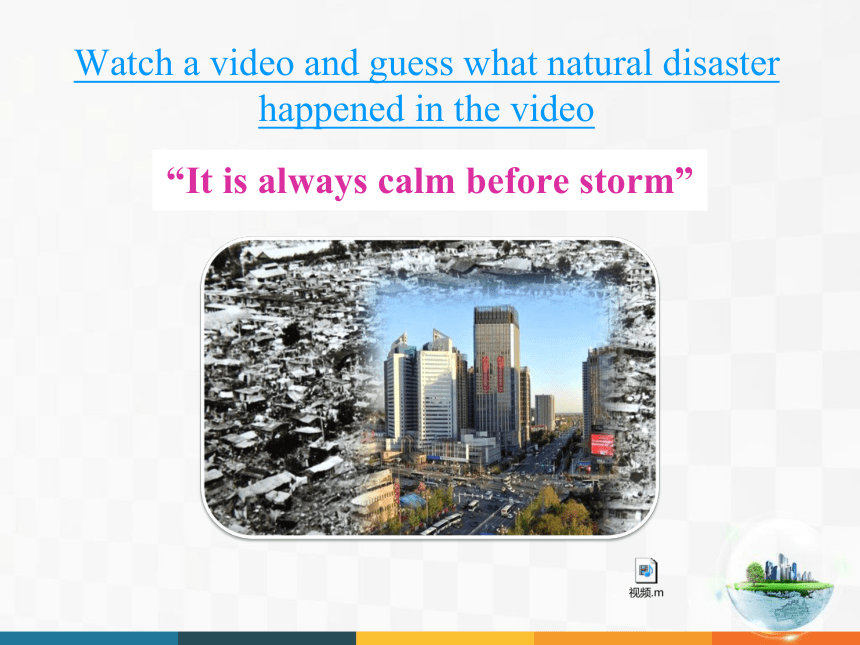
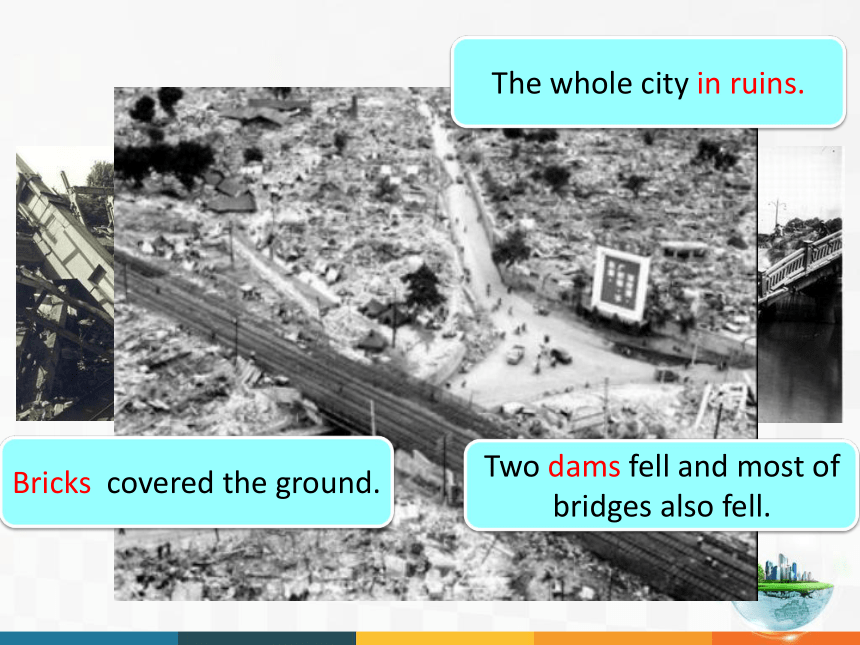
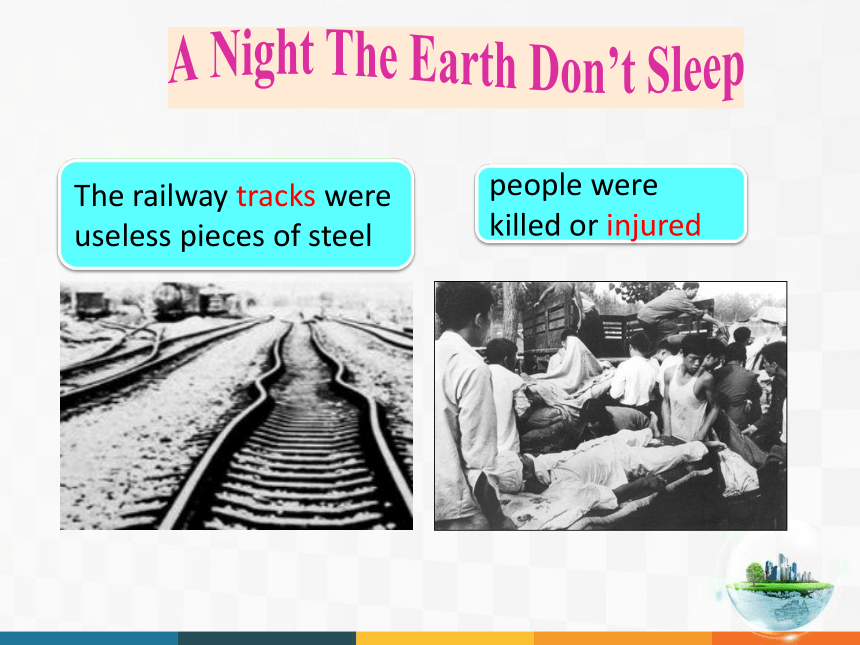
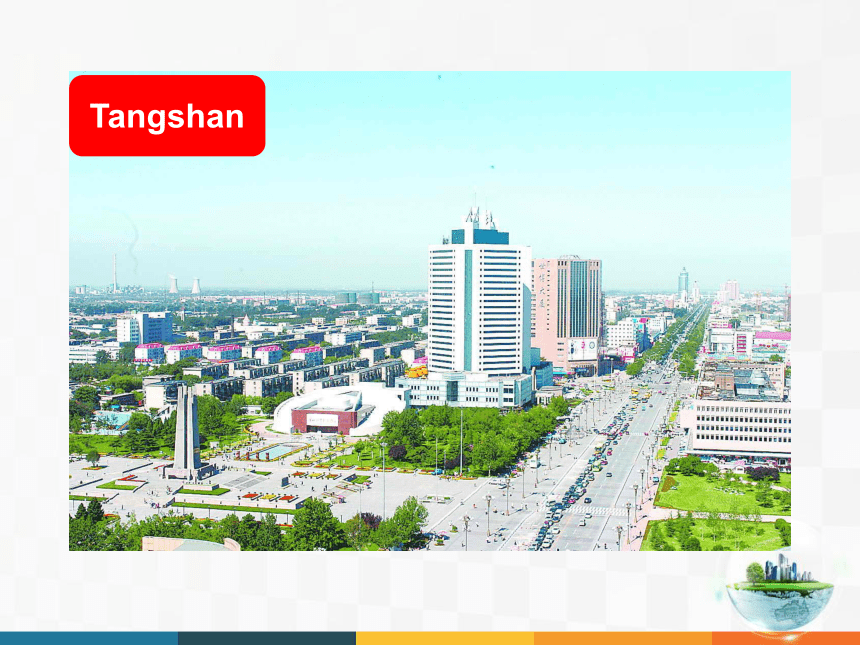
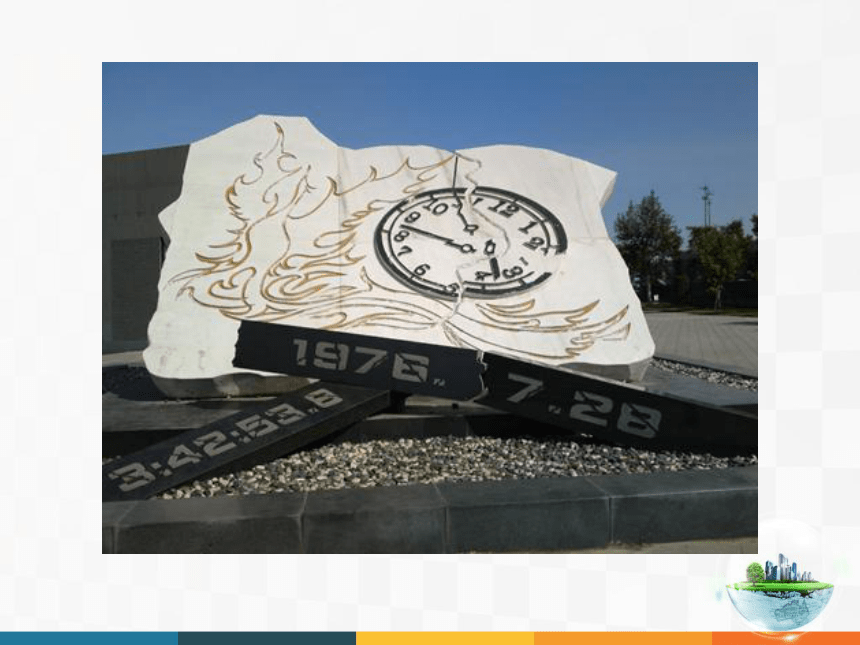
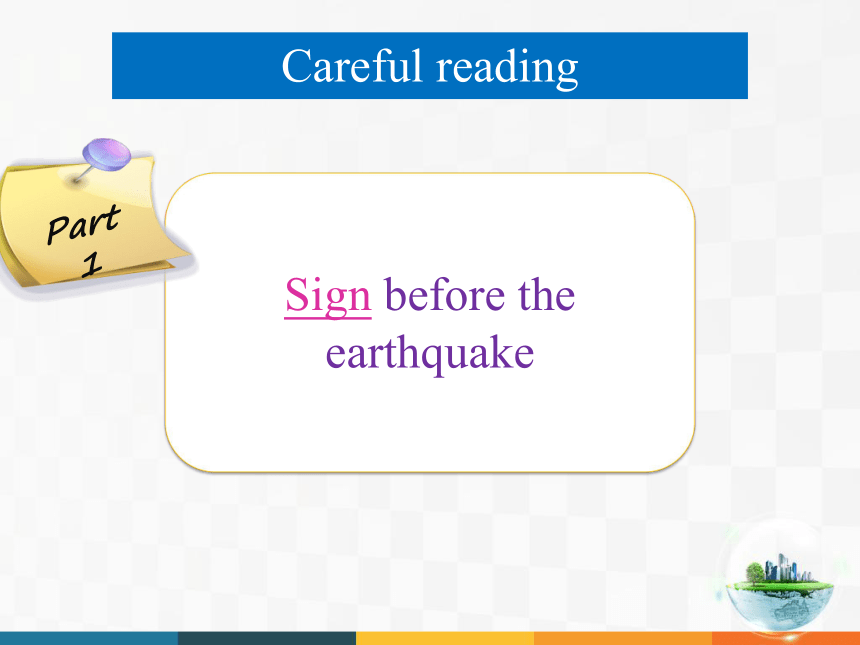

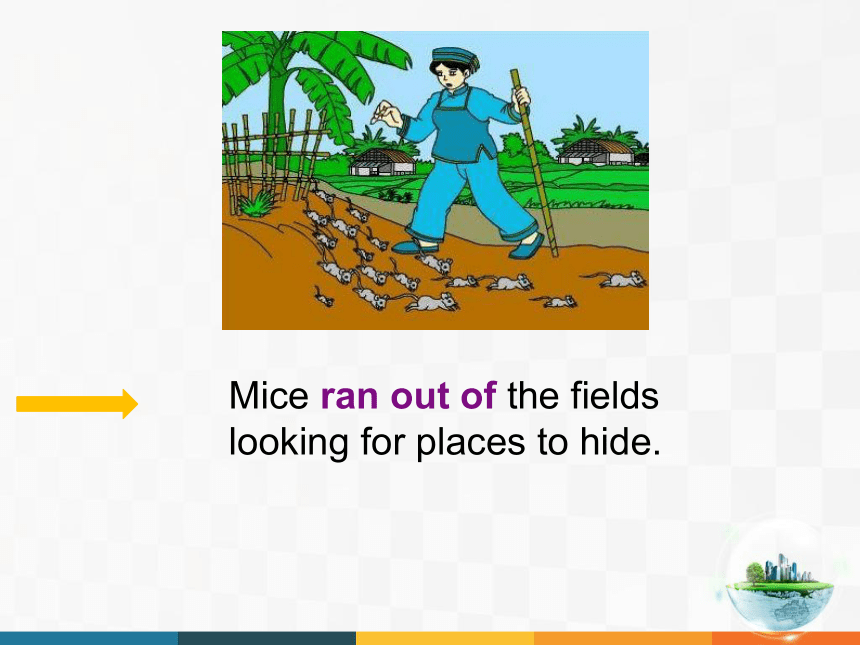

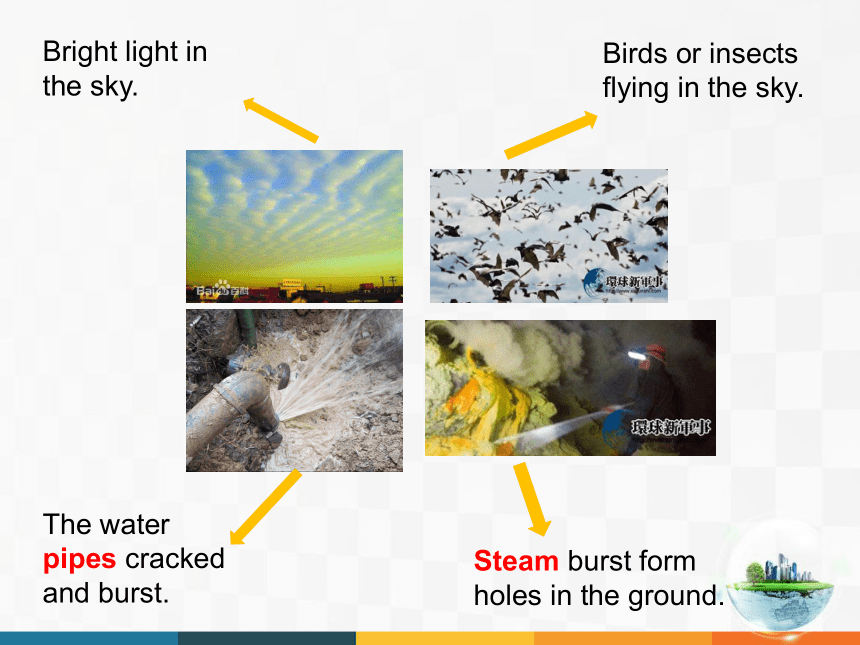
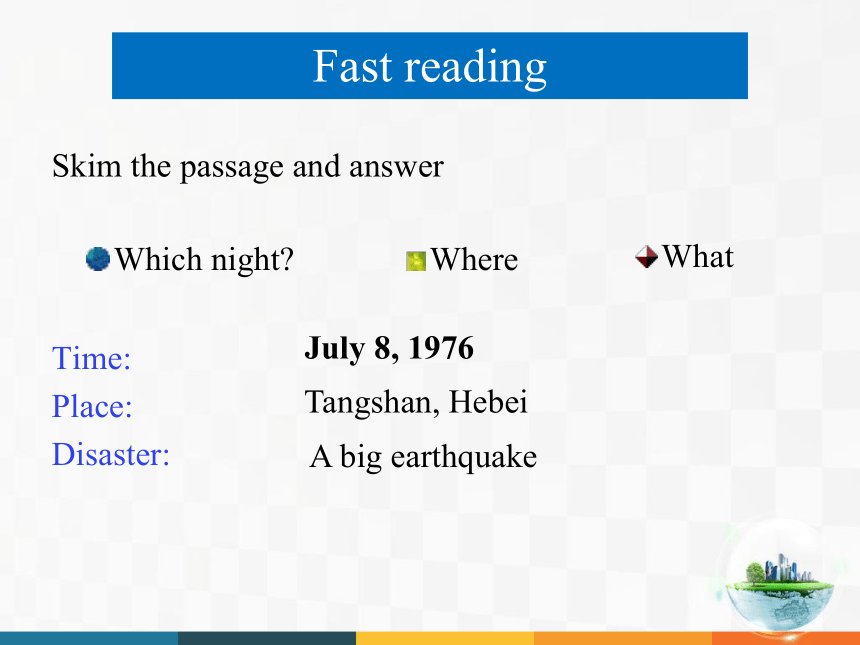
文档简介
课件79张PPT。A Night The Earth Don’t SleepEarthquakeWatch a video and guess what natural disaster happened in the videoTangshan“It is always calm before storm”The whole city in ruins.Bricks covered the ground.Two dams fell and most of bridges also fell.people were killed or injured A Night The Earth Don’t SleepThe railway tracks were useless pieces of steel TangshanSign before the earthquakeCareful readingThe water in the village wells rose and fell.What will happen before the earthquake ?Mice ran out of the fields looking for places to hide. The fish jumped out of the waterBirds or insects flying in the sky. Steam burst form holes in the ground.Bright light in the sky. The water pipes cracked and burst. Fast readingSkim the passage and answer
Time:
Place:
Disaster:Which night? WhereWhatJuly 8, 1976Tangshan, Hebei A big earthquakeFind the top sentences in each paragraph. rescueRead the text quickly,and divide the passage into three parts,according to the three words. damage signMatching Para 1Para 2-3Para 4Damage and destruction of earthquakeRescue after the earthquakeStrange things before the earthquakeThe damage caused during the earthquakeRead Para 2&3 carefully and fill the blanks of the nation felt the earthquake.
In terrible seconds a large city lay in ruins.
A huge crack that was kilometres long and metres wide cut across houses.
of the people died or were injured during the earthquake.
The number of people who were killed or injured reached more than .
All of the city’s hospitals, Factories and buildings and
of its homes were gone. 1/3 15 8 30 2/3 400,000 75% 90% Rescue work
after the earthquakeRead para4 carefully and choose the best answer.Which of the following is not true according the passage.
A. Many soldiers helped to rescue the people who were trapped under the ruins.
B. Most of the twenty thousand miners were rescued from the coal mines.
C. Workers built shelters for homeless survivors.Ten Post readingSuppose there would be an earthquake, in the following situations, what should we do to keep ourselves safe?discussionClose the post.Hide under a piece of heavy furniture.Cannot take the lift.Cover your nose and mouth with a wet towel and squat down.If you are staying indoors... If you are outdoors,….1.stay outside until the shaking stops.2.away from the place where something can break easily.3.protect your eyes by keeping your head down.Complete the passage with words from text. It was a night. The dam cracked and
then under the weight of the water. The water went all over the fields and quite a few villages along the river. Some buildings were in ruins and some farmers were at the top of their houses. The water filled the canals and the . Dead bodies and animals were seen everywhere. People were , But they had to the dead bodies for healthy reasons. It was a very sad time. frighteningshockedburstdestroyed trappedInjured wellsburyhomeworkThanks !◎burst (burst,burst) vi.爆裂;爆发 n.突然破裂;爆发
①The dam burst because of heavy rain.
由于下大雨,那个大坝决堤了。②Hearing the sad news,he ______ ______ ______ .
听到这个坏消息,他突然哭起来。
③Seeing his funny looks,all of us ____________ ______.
看到他滑稽的表情,我们都突然笑起来。
④He burst into the room without knocking on the door,which surprised us all.
他没有敲门就闯入房间使我们很惊奇。
⑤I felt as if my heart would burst with joy.
我觉得自己高兴得心花怒放。
答案:②burst into tears/burst out crying
③burst into laughter/burst out laughing[巧学助记]◎think little of对……不在意,对……没多考虑
①He thought little of his future during his childhood.
他童年时期没多考虑过他的未来。think highly of=think much of 重视、高度评价……
think poorly of 不放在眼里,轻视
think nothing of 轻视;认为无所谓
think ill of=think badly of 认为……不好
think well of 认为……好,器重②Everyone present at the meeting ______ ______ ______his speech.
参会的每一个人都高度评价他的演讲。
③As young men we shouldn’t ______ ______ ______ the old.
作为年轻人我们不应该轻视老年人。
答案:②thought highly/much of ③think poorly/badly/ill of
④Many people thought nothing of his advice.
很多人对他的建议不以为然。
[名师点津]
当think highly/well/much of...用于被动语态结构时,副词应放于其修饰的动词前,即be highly/well/much thought of。
⑤His work is highly thought of by the critics.
他的作品深受评论家推崇。◎at an end结束;终结
①I must warn you that my patience is almost at an end.
我必须警告你我已经没有耐心了。
②Their friendship was at an end.
他们的友谊结束了。
③He lives at the end of the garden.
他住在花园的尽头。
④By the end of last month,she had been on that ship for two years.
到上个月末为止,她在那条船上已待了两年了。
⑤They gave up the plan in the end.
最终他们放弃了那项计划。
⑥At last the meeting came to an end.
最后会议结束了。◎ruin n.废墟;毁灭 vt.毁灭;使破产
①The bad weather ruined our trip.天气恶劣,破坏了我们的旅行。be/lie in ruins 严重受损;破败不堪
fall/come into ruins毁灭,成为废墟
ruin oneself 自取灭亡
ruin one’s family/health/fame毁坏某人的家庭/健康/名誉②After the big earthquake the city ______ ______ ______.
大地震过后,那座城市成为了废墟。
答案:was/lay in ruins
③The famous hospital came into ruins in the big fire.
在那场大火中那个著名的医院成为了废墟。
④If you don’t listen to me,I think you will ruin yourself.
如果你不听我的,我认为你将自取灭亡。
⑤Heavy smoking ruined his health.
吸烟过度毁坏了他的健康。 destroy/damage/ruin[巧学助记]用destroy/damage/ruin的正确形式填空
①He knocked over a bottle of ink and ________ my painting.
②A torrent of rain came down and ________ the crops.
③His house was completely ________,so the farmer decided to build a new one.
④The house has fallen into ________.
答案:①ruined ②damaged ③destroyed ④ruins◎injure vt.损害;伤害
①He can’t play today,because he’s injured his knee.
他弄伤了膝盖,因此今天不能上场。(1)injured adj. 受伤的,受委屈的
the injured 伤员
(2)injury n. 伤,伤口;伤害
do an injury to sb. 伤害某人
②People have been seriously injured in a road accident.
在一次交通事故中,有人严重受伤。
③He suffered serious injuries to arms and legs.
他的胳膊和腿都受了重伤。
④The injured were taken to the hospital.
受伤者都被送进了医院。 injure/wound/hurt/harm[巧学助记] 选词填空(injure/hurt/harm/wound)
①It ________ me to think that he would lie to me.
②Two women have been badly ________ in the accident.
③Luckily no one got ________ in the battle.
④He ________ his back by playing tennis.
⑤Don’t ________ your eyes by reading in poor light.
答案:①hurt ②injured ③wounded ④hurt ⑤harm◎shock vt.&vi.(使)震惊;震动 n.休克;打击;震惊
①The news of his death shocked the world.
他的死讯让这个世界为之震惊。
②She was taken to hospital suffering from shock.
她因休克被送往医院。(1)be a shock to sb. 对某人来说是个打击
(2)shocked adj.震惊的;惊讶的
be shocked at/by 对……吃惊
be shocked to do sth. 做某事很吃惊
(3)shocking adj.令人震惊的③The news was a shock to the family.
这个消息让全家人感到震惊。
④We ______ ______ ______ ______ the news of his death.
听到他的死讯,我们都很震惊。
答案:were all shocked at/by
⑤I was shocked to know he was injured.
听到他受伤后,我很震惊。
⑥All the people present at the meeting felt shocked at the shocking news.
所有出席会议的人听到这个令人震惊的消息都非常吃惊。
[名师点津]
(1) shocked指人“感到震惊的”;
shocking指事物“令人震惊的”。
(2)shock表示“一件令人震惊的事”时,是可数名词,常和不定冠词连用。◎trap vt.使陷入困境 n.陷阱;困境
①The train was trapped underground by a big fire.
火车被大火困在地下。
②He felt that agreement was a trap.
他觉得那个协议是一个陷阱。(1)be trapped使陷入困境
trap sb.into(doing)sth. 诱骗某人做某事
(2)set a trap 设置陷阱;布下圈套
fall/walk into a trap 落入圈套◎(1)dig out掘出;发现
①I am hoping to dig out some gold in the earth.
我希望在泥土里挖掘出一些黄金。dig into 深入钻研,挖掘
dig up 挖掘;挖到
dig for 采掘,探寻③They were trapped in the burning building.
他们被困在着火的楼房里。
④The police trapped him into telling the truth.
警察设圈套使他讲出实情。
⑤Hopefully,the thief will fall right into our trap.
如果顺利的话,那个贼会恰好落入我们布下的圈套。②Actually our company was just beginning to dig into the matter.
实际上,我们公司才刚刚研究这个问题。
③It took us hours to dig up all of the peanuts.
我们花了好几个小时才把所有花生都挖出来。
④Some large companies used huge machines to dig for gold.
一些大公司利用大型机器设备开采黄金。◎(2)bury vt.埋葬;掩埋;隐藏
①He buried the secret deep within himself.
他把这个秘密深藏在自己心里。
②Julie turned away,burying her face in the scarf.
朱莉转过身,把脸埋在围巾里。③He buried himself in his detective story again.
他又沉浸在他的侦探故事里了。
④Ever since he moved there,he has been buried in his research work.
自从搬到那里以后,他一直专注于他的研究工作。
⑤Buried in his study,he didn’t know that all the others had left.
他埋头学习,不知道其他人都早已离开了。[名师点津] 句⑤中Buried in his study为过去分词短语作状语,相当于原因状语从句:Because he was buried in his study,he didn’t know that all the others had left.
[巧学助记]◎a (great) number of许多;大量的
① (2015·高考浙江卷)The thing is,a number of them have admitted that despite their success,they aren’t happy.
实际情况是,他们中的很多人承认尽管他们很成功,但并不快乐。
②The number of the students standing outside is about twenty.
有大约20名学生站在外面。选词填空(a [great] number of/the number of)
①________________ cars on expressways is rising because of free passage during holidays.
②______________people have applied for the job.
③What’s__________________annual traffic accidents?
④____________new houses have been built here.
答案:①The number of ②A(great)number of
③the number of ④A (great) number of[句式剖析]
该句为复合句,as if=as though,意为“仿佛;好像”,可用来引导表语从句和方式状语从句。
①Look at the clouds in the sky!It looks as if it is going to rain.
看看天上的云彩!看起来要下雨。
②He acts as if (as though) he were an expert.
他表现得就像个专家。
③They talked as if (as though) they had been friends for years.
他们谈起话来就像多年的老朋友。as if从句语气的选择
(1)如果所引导的从句表示的情况是真实的或是极有可能发生的,句子要用陈述语气。
(2)当说话人所陈述的是不真实的或极不可能发生或存在的情况时,从句用虚拟语气。
①如果从句表示与现在事实相反,谓语动词用一般过去时。
②从句表示与过去事实相反,谓语动词用“had+过去分词”。
③从句表示与将来事实相反,谓语动词用“would/could/might+动词原形”。用所给的词适当形式填空
④Henry failed in the game,but he looked as if nothing _____________ (happen).
⑤When a pencil is partly in a glass of water,it looks as if it ________________ (break).
⑥She walked slowly as if she _____________ (hurt) her leg.had happenedwere brokenhad hurt[句式剖析]
everywhere在该句中用作从属连词,引导让步状语从句,意为“无论哪里;不论在什么地方”。
①Jordan is warmly welcomed everywhere he goes.
乔丹所到之处都受到热烈地欢迎。②I will go everywhere my parents want me to go.
父母要我去哪里我就去哪里。
③Everywhere he goes,he will not forget the terrible experience.
无论他走到哪儿,他永远也忘不了那次可怕的经历。everywhere可用作副词,意为“到处;处处”;在句中作状语。有时也用作名词,意为“每个地方”。
④I can’t find my pen though I’ve looked everywhere.
我到处找那支钢笔,可就是找不到。
⑤People came from everywhere to celebrate the victory.人们从各处赶来庆祝胜利。[句式剖析]
当not与all,both,everyone,everybody,everything以及“every+名词”出现在同一个句子中时,不管not在它们之前还是之后都表示部分否定。
①Both of them haven’t read this story.
=Not both of them have read this story.
并非他们两人都读过这个故事。②Not every man is honest.
=Every man is not honest. 并不是每个人都诚实。
③None of these things are mine.
这些东西都不是我的。
④Nobody agrees with you.
没有人会同意你。
⑤Neither book is interesting and instructive.
两本书都没有趣味,都没有教育意义。当表示完全否定意义时,英语中常用no,none,nobody,nothing,no one,neither等词与谓语的肯定式连用来表达。
Time:
Place:
Disaster:Which night? WhereWhatJuly 8, 1976Tangshan, Hebei A big earthquakeFind the top sentences in each paragraph. rescueRead the text quickly,and divide the passage into three parts,according to the three words. damage signMatching Para 1Para 2-3Para 4Damage and destruction of earthquakeRescue after the earthquakeStrange things before the earthquakeThe damage caused during the earthquakeRead Para 2&3 carefully and fill the blanks of the nation felt the earthquake.
In terrible seconds a large city lay in ruins.
A huge crack that was kilometres long and metres wide cut across houses.
of the people died or were injured during the earthquake.
The number of people who were killed or injured reached more than .
All of the city’s hospitals, Factories and buildings and
of its homes were gone. 1/3 15 8 30 2/3 400,000 75% 90% Rescue work
after the earthquakeRead para4 carefully and choose the best answer.Which of the following is not true according the passage.
A. Many soldiers helped to rescue the people who were trapped under the ruins.
B. Most of the twenty thousand miners were rescued from the coal mines.
C. Workers built shelters for homeless survivors.Ten Post readingSuppose there would be an earthquake, in the following situations, what should we do to keep ourselves safe?discussionClose the post.Hide under a piece of heavy furniture.Cannot take the lift.Cover your nose and mouth with a wet towel and squat down.If you are staying indoors... If you are outdoors,….1.stay outside until the shaking stops.2.away from the place where something can break easily.3.protect your eyes by keeping your head down.Complete the passage with words from text. It was a night. The dam cracked and
then under the weight of the water. The water went all over the fields and quite a few villages along the river. Some buildings were in ruins and some farmers were at the top of their houses. The water filled the canals and the . Dead bodies and animals were seen everywhere. People were , But they had to the dead bodies for healthy reasons. It was a very sad time. frighteningshockedburstdestroyed trappedInjured wellsburyhomeworkThanks !◎burst (burst,burst) vi.爆裂;爆发 n.突然破裂;爆发
①The dam burst because of heavy rain.
由于下大雨,那个大坝决堤了。②Hearing the sad news,he ______ ______ ______ .
听到这个坏消息,他突然哭起来。
③Seeing his funny looks,all of us ____________ ______.
看到他滑稽的表情,我们都突然笑起来。
④He burst into the room without knocking on the door,which surprised us all.
他没有敲门就闯入房间使我们很惊奇。
⑤I felt as if my heart would burst with joy.
我觉得自己高兴得心花怒放。
答案:②burst into tears/burst out crying
③burst into laughter/burst out laughing[巧学助记]◎think little of对……不在意,对……没多考虑
①He thought little of his future during his childhood.
他童年时期没多考虑过他的未来。think highly of=think much of 重视、高度评价……
think poorly of 不放在眼里,轻视
think nothing of 轻视;认为无所谓
think ill of=think badly of 认为……不好
think well of 认为……好,器重②Everyone present at the meeting ______ ______ ______his speech.
参会的每一个人都高度评价他的演讲。
③As young men we shouldn’t ______ ______ ______ the old.
作为年轻人我们不应该轻视老年人。
答案:②thought highly/much of ③think poorly/badly/ill of
④Many people thought nothing of his advice.
很多人对他的建议不以为然。
[名师点津]
当think highly/well/much of...用于被动语态结构时,副词应放于其修饰的动词前,即be highly/well/much thought of。
⑤His work is highly thought of by the critics.
他的作品深受评论家推崇。◎at an end结束;终结
①I must warn you that my patience is almost at an end.
我必须警告你我已经没有耐心了。
②Their friendship was at an end.
他们的友谊结束了。
③He lives at the end of the garden.
他住在花园的尽头。
④By the end of last month,she had been on that ship for two years.
到上个月末为止,她在那条船上已待了两年了。
⑤They gave up the plan in the end.
最终他们放弃了那项计划。
⑥At last the meeting came to an end.
最后会议结束了。◎ruin n.废墟;毁灭 vt.毁灭;使破产
①The bad weather ruined our trip.天气恶劣,破坏了我们的旅行。be/lie in ruins 严重受损;破败不堪
fall/come into ruins毁灭,成为废墟
ruin oneself 自取灭亡
ruin one’s family/health/fame毁坏某人的家庭/健康/名誉②After the big earthquake the city ______ ______ ______.
大地震过后,那座城市成为了废墟。
答案:was/lay in ruins
③The famous hospital came into ruins in the big fire.
在那场大火中那个著名的医院成为了废墟。
④If you don’t listen to me,I think you will ruin yourself.
如果你不听我的,我认为你将自取灭亡。
⑤Heavy smoking ruined his health.
吸烟过度毁坏了他的健康。 destroy/damage/ruin[巧学助记]用destroy/damage/ruin的正确形式填空
①He knocked over a bottle of ink and ________ my painting.
②A torrent of rain came down and ________ the crops.
③His house was completely ________,so the farmer decided to build a new one.
④The house has fallen into ________.
答案:①ruined ②damaged ③destroyed ④ruins◎injure vt.损害;伤害
①He can’t play today,because he’s injured his knee.
他弄伤了膝盖,因此今天不能上场。(1)injured adj. 受伤的,受委屈的
the injured 伤员
(2)injury n. 伤,伤口;伤害
do an injury to sb. 伤害某人
②People have been seriously injured in a road accident.
在一次交通事故中,有人严重受伤。
③He suffered serious injuries to arms and legs.
他的胳膊和腿都受了重伤。
④The injured were taken to the hospital.
受伤者都被送进了医院。 injure/wound/hurt/harm[巧学助记] 选词填空(injure/hurt/harm/wound)
①It ________ me to think that he would lie to me.
②Two women have been badly ________ in the accident.
③Luckily no one got ________ in the battle.
④He ________ his back by playing tennis.
⑤Don’t ________ your eyes by reading in poor light.
答案:①hurt ②injured ③wounded ④hurt ⑤harm◎shock vt.&vi.(使)震惊;震动 n.休克;打击;震惊
①The news of his death shocked the world.
他的死讯让这个世界为之震惊。
②She was taken to hospital suffering from shock.
她因休克被送往医院。(1)be a shock to sb. 对某人来说是个打击
(2)shocked adj.震惊的;惊讶的
be shocked at/by 对……吃惊
be shocked to do sth. 做某事很吃惊
(3)shocking adj.令人震惊的③The news was a shock to the family.
这个消息让全家人感到震惊。
④We ______ ______ ______ ______ the news of his death.
听到他的死讯,我们都很震惊。
答案:were all shocked at/by
⑤I was shocked to know he was injured.
听到他受伤后,我很震惊。
⑥All the people present at the meeting felt shocked at the shocking news.
所有出席会议的人听到这个令人震惊的消息都非常吃惊。
[名师点津]
(1) shocked指人“感到震惊的”;
shocking指事物“令人震惊的”。
(2)shock表示“一件令人震惊的事”时,是可数名词,常和不定冠词连用。◎trap vt.使陷入困境 n.陷阱;困境
①The train was trapped underground by a big fire.
火车被大火困在地下。
②He felt that agreement was a trap.
他觉得那个协议是一个陷阱。(1)be trapped使陷入困境
trap sb.into(doing)sth. 诱骗某人做某事
(2)set a trap 设置陷阱;布下圈套
fall/walk into a trap 落入圈套◎(1)dig out掘出;发现
①I am hoping to dig out some gold in the earth.
我希望在泥土里挖掘出一些黄金。dig into 深入钻研,挖掘
dig up 挖掘;挖到
dig for 采掘,探寻③They were trapped in the burning building.
他们被困在着火的楼房里。
④The police trapped him into telling the truth.
警察设圈套使他讲出实情。
⑤Hopefully,the thief will fall right into our trap.
如果顺利的话,那个贼会恰好落入我们布下的圈套。②Actually our company was just beginning to dig into the matter.
实际上,我们公司才刚刚研究这个问题。
③It took us hours to dig up all of the peanuts.
我们花了好几个小时才把所有花生都挖出来。
④Some large companies used huge machines to dig for gold.
一些大公司利用大型机器设备开采黄金。◎(2)bury vt.埋葬;掩埋;隐藏
①He buried the secret deep within himself.
他把这个秘密深藏在自己心里。
②Julie turned away,burying her face in the scarf.
朱莉转过身,把脸埋在围巾里。③He buried himself in his detective story again.
他又沉浸在他的侦探故事里了。
④Ever since he moved there,he has been buried in his research work.
自从搬到那里以后,他一直专注于他的研究工作。
⑤Buried in his study,he didn’t know that all the others had left.
他埋头学习,不知道其他人都早已离开了。[名师点津] 句⑤中Buried in his study为过去分词短语作状语,相当于原因状语从句:Because he was buried in his study,he didn’t know that all the others had left.
[巧学助记]◎a (great) number of许多;大量的
① (2015·高考浙江卷)The thing is,a number of them have admitted that despite their success,they aren’t happy.
实际情况是,他们中的很多人承认尽管他们很成功,但并不快乐。
②The number of the students standing outside is about twenty.
有大约20名学生站在外面。选词填空(a [great] number of/the number of)
①________________ cars on expressways is rising because of free passage during holidays.
②______________people have applied for the job.
③What’s__________________annual traffic accidents?
④____________new houses have been built here.
答案:①The number of ②A(great)number of
③the number of ④A (great) number of[句式剖析]
该句为复合句,as if=as though,意为“仿佛;好像”,可用来引导表语从句和方式状语从句。
①Look at the clouds in the sky!It looks as if it is going to rain.
看看天上的云彩!看起来要下雨。
②He acts as if (as though) he were an expert.
他表现得就像个专家。
③They talked as if (as though) they had been friends for years.
他们谈起话来就像多年的老朋友。as if从句语气的选择
(1)如果所引导的从句表示的情况是真实的或是极有可能发生的,句子要用陈述语气。
(2)当说话人所陈述的是不真实的或极不可能发生或存在的情况时,从句用虚拟语气。
①如果从句表示与现在事实相反,谓语动词用一般过去时。
②从句表示与过去事实相反,谓语动词用“had+过去分词”。
③从句表示与将来事实相反,谓语动词用“would/could/might+动词原形”。用所给的词适当形式填空
④Henry failed in the game,but he looked as if nothing _____________ (happen).
⑤When a pencil is partly in a glass of water,it looks as if it ________________ (break).
⑥She walked slowly as if she _____________ (hurt) her leg.had happenedwere brokenhad hurt[句式剖析]
everywhere在该句中用作从属连词,引导让步状语从句,意为“无论哪里;不论在什么地方”。
①Jordan is warmly welcomed everywhere he goes.
乔丹所到之处都受到热烈地欢迎。②I will go everywhere my parents want me to go.
父母要我去哪里我就去哪里。
③Everywhere he goes,he will not forget the terrible experience.
无论他走到哪儿,他永远也忘不了那次可怕的经历。everywhere可用作副词,意为“到处;处处”;在句中作状语。有时也用作名词,意为“每个地方”。
④I can’t find my pen though I’ve looked everywhere.
我到处找那支钢笔,可就是找不到。
⑤People came from everywhere to celebrate the victory.人们从各处赶来庆祝胜利。[句式剖析]
当not与all,both,everyone,everybody,everything以及“every+名词”出现在同一个句子中时,不管not在它们之前还是之后都表示部分否定。
①Both of them haven’t read this story.
=Not both of them have read this story.
并非他们两人都读过这个故事。②Not every man is honest.
=Every man is not honest. 并不是每个人都诚实。
③None of these things are mine.
这些东西都不是我的。
④Nobody agrees with you.
没有人会同意你。
⑤Neither book is interesting and instructive.
两本书都没有趣味,都没有教育意义。当表示完全否定意义时,英语中常用no,none,nobody,nothing,no one,neither等词与谓语的肯定式连用来表达。
